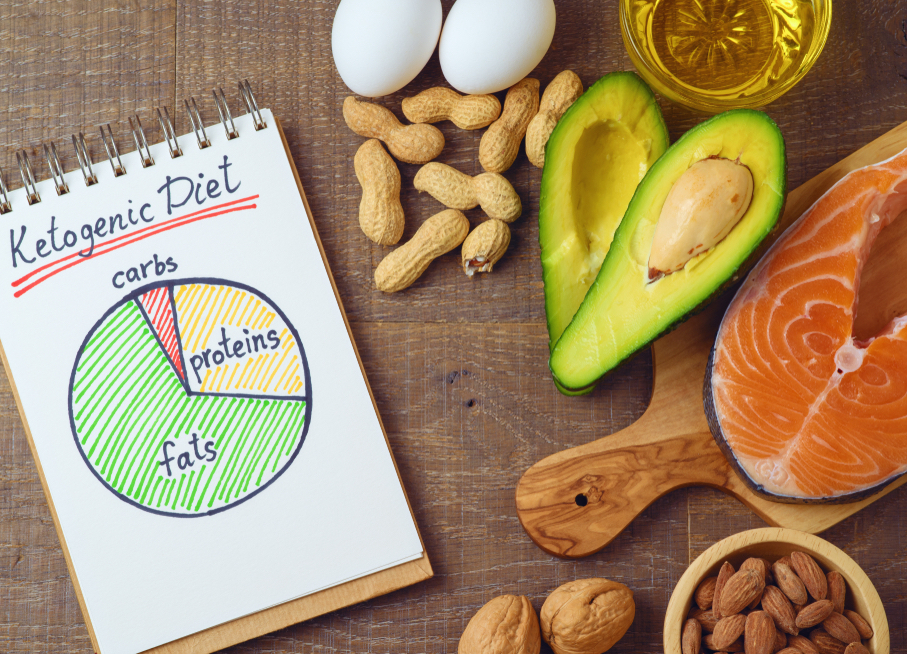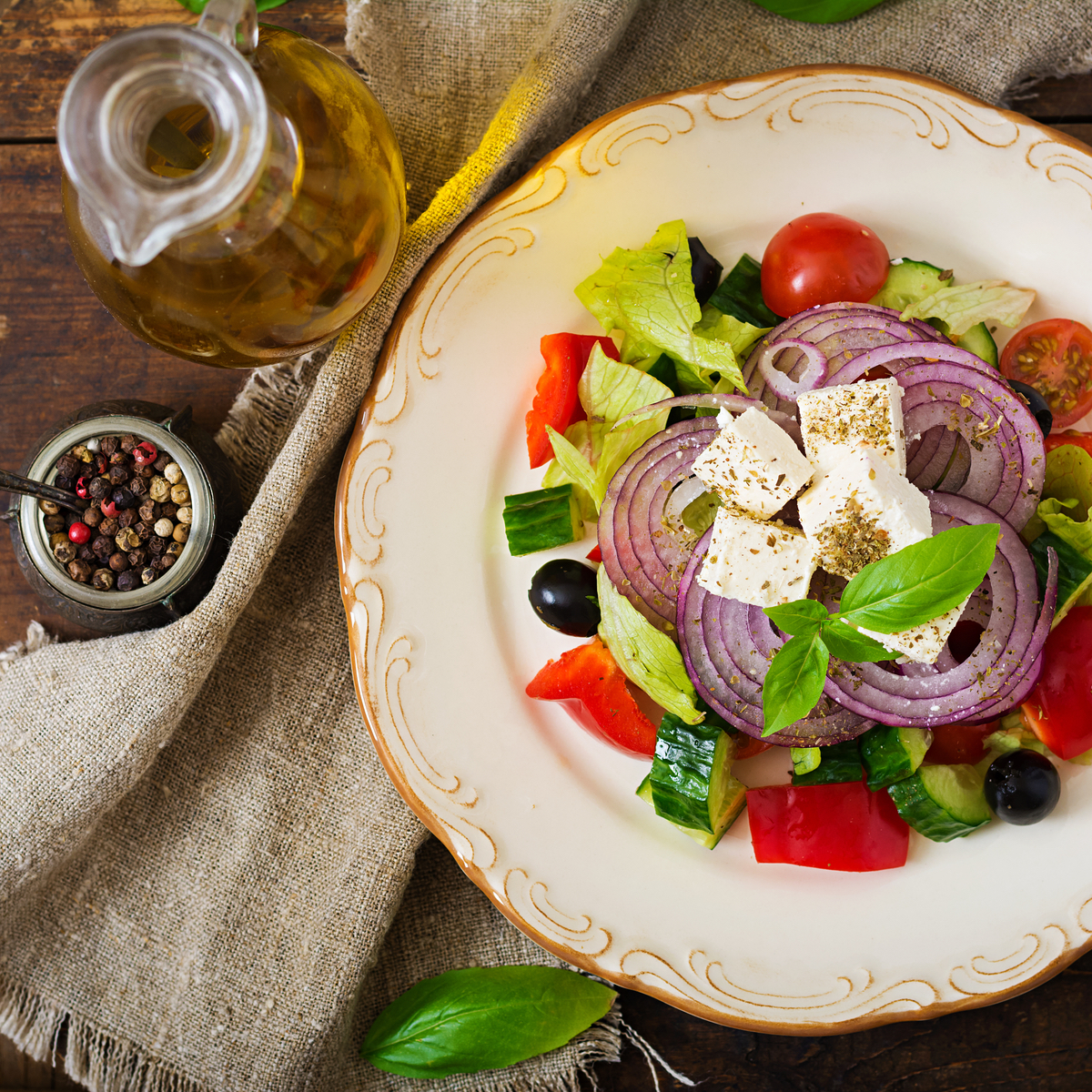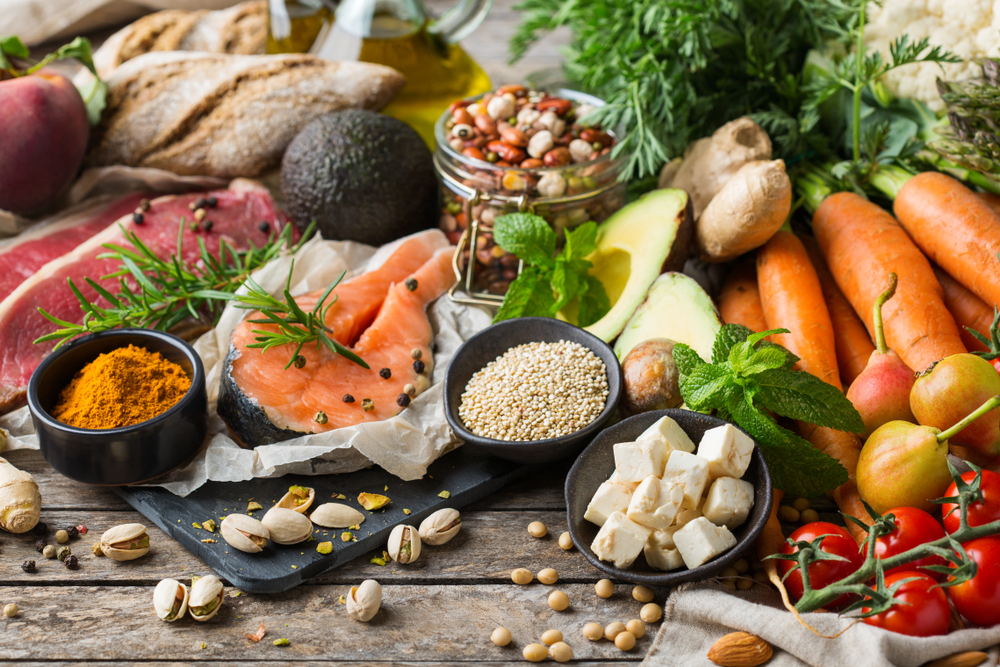SUMMARY
Get the rundown on the Mediterranean diet, how it works, and learn a few simple recipes to get started.
There’s a lot of research out there that tells us a Mediterranean diet is a great way to stay healthy. If you’re interested in eating more heart-healthy food that can potentially help you live longer, we’ve created a Mediterranean diet food list for fast and tasty meal ideas to help you eat more Mediterranean-focused meals.
Incorporating even a few meals into your diet can help you access the benefits of this amazing diet, so pick your favorites from this list and unlock the secret to a longer, healthier life.
Table of Contents
What is the Mediterranean Diet Good For?
Who Should Follow the Mediterranean Diet?
How Do You Follow a Mediterranean Diet?
Mediterranean Diet Food List
Recipes Using Your Mediterranean Diet Food List
– 15 Minute Spicy Shrimp and Quinoa
– Sautéed Yellow Squash Skillet
– Baked Tilapia with Lemon
– Grain Bowl with Sautéed Spinach
– Salmon Pita Sandwich
What is the Mediterranean Diet Good For?
Besides being full of delicious food options, the Mediterranean Diet is a style of eating adapted from the diets of people living by the Mediterranean Sea. Researchers found that eating a diet filled with healthy, lean fats like those found in fish and olive oil, as well as whole grains, fresh produce, and limited dairy can lead to many health benefits like
- Decreased risk of heart disease
- Lower cholesterol and blood pressure
- Prevents and treats Type II Diabetes
- Reduced possibility of developing Alzheimer’s
- Increased brain function and better memory
- Lessened symptoms of depression
- Decreased chance of developing certain eye diseases
- Better weight loss
- Reducing effects of aging
- Reduces inflammation leading to the above
How Does the Mediterranean Diet Help with Inflammation and Why is that Important?
Chronic inflammation is harmful to the body! It is a destructive cellular process that can cause heart disease, diabetes, dementia, premature aging, obesity, cancer, and other health issues in the long run.
Foods promoted by the Mediterranean diet are rich in antioxidants and nutrients like polyphenols, flavonoids, carotenoids, and Omega-3’s which all fight against inflammation in the body. In fact, it’s believed to be one of the main reasons this diet is so good for you.
Who Should Follow the Mediterranean Diet?

We know it’s cliché to say everyone, but…. everyone! Seriously, the benefits of the Mediterranean diet are plentiful, which should give any person reason enough to try it. Not to mention, it’s been ranked the #1 best overall diet in the world according to US News Today.
Anyone looking to be more conscious of their cardiovascular health, managing their weight or blood sugar, or someone living with a chronic health condition will benefit the most from the Mediterranean diet.
Though There Are Many Benefits, You Should Keep These Factors in Mind
It is easy to overdo your fat content while on the Mediterranean diet, even if the fat is the healthy kind. Overeating things like nuts and avocado oil will increase your calories fast and overdoing even healthy fats can work against you.
It’s also easy to miss essential nutrients and foods when you’re focusing on the healthy fat content in your meals. While you’re eating more fruits and vegetables, it’s important to remember to get enough complex carbs, iron, and protein as well.
Keeping a balance while on the Mediterranean diet with a variety of foods is the key to getting the most out of your diet.
How Do You Follow a Mediterranean Diet?
Healthy fats are the key to the Mediterranean diet, as is reducing processed and refined foods. You should aim to eat lots of fruits, vegetables, whole grains, and legumes as your main meal ingredients.
Olive oil is recommended in place of things like butter or margarine and focus on natural sources of healthy fats are emphasized: avocados, nuts, and oily fatty fish (like salmon and sardines).
Fish and other kinds of seafood (like oysters, crab, and shrimp) should be your main animal protein source in place of red meat and chicken, excluding some dairy products like whole fat cheeses, flavored yogurt, and eggs. Some dairy products like Greek yogurt and low-fat cheeses are permitted.
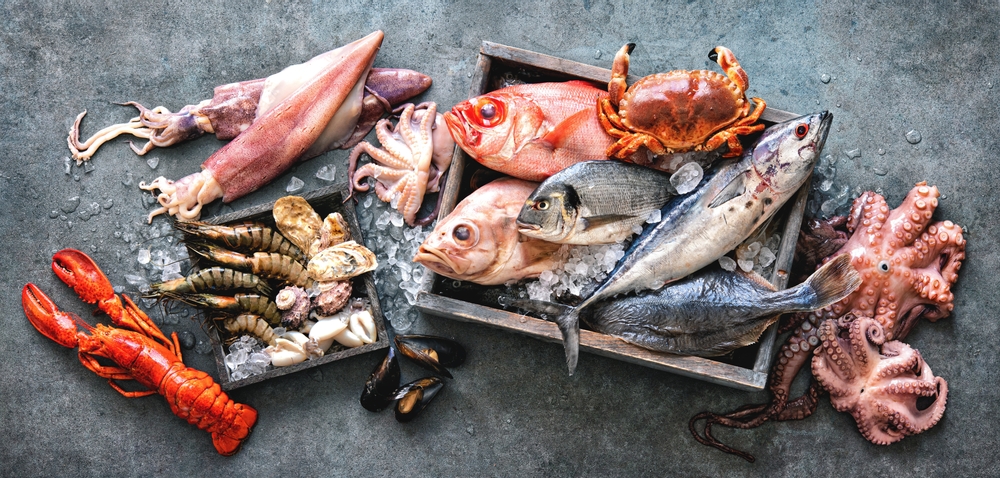
Overall, you should focus on whole foods: fruits, vegetables, legumes, whole grains, nuts, seeds, and fatty fish. Avoid red meat and processed foods as much as possible.
Here’s what your overall plan should look like:
- Vegetables – 3 servings a day or more
- Fruits – 2 servings a day or more
- Whole Grains – the more the better! Use them whenever a recipe calls for rice, bread, or pasta.
- Legumes – 3 servings a week or more
- Nuts & Seeds – 3 servings a week or more
- Fish & Seafood – 3 servings a week or more
- Poultry – As needed if you love chicken or turkey but leave room for the more important foods listed above.
- Red Meats – Less than 3 servings per month
- Sweets & Baked Goods – Never is best, but it’s okay to treat yourself every now and then.
Mediterranean Diet Food List
If you’re out shopping, here’s a list of all the foods you should be on the lookout for. Many of these foods fall into multiple categories, making them super beneficial and healthy!
Protein
- Beans
- Lentils
- Tofu
- Legumes
- Quinoa
- Crab
- Clams and Oysters
- Shrimp
- Mussels
Fats
- Extra Virgin Olive Oil
- Avocados
- Salmon
- Mackerel
- Tuna
- Sardines
- Olives
Produce
- All Fruits
- All Berries
- All Non-Starchy Vegetables (broccoli, lettuce, brussels sprouts, etc.)
- All Starchy Vegetables (sweet potatoes, parsnips, beets, etc.)
- Root Vegetables (radishes, onion, carrots, etc.)
- Tubers (potato, yams, turnips, etc.)
Grains
- Whole Grain Crackers
- Whole Grain Pastas
- Brown or Wild Rice
- Farro
- Steel-Cut Oatmeal
- Bulgur Wheat
- Barley
- Couscous
- Spelt
- Buckwheat
Dairy
- Plain Greek Yogurt (unflavored)
- Low-Fat Ricotta
- Low-Fat Cottage Cheese
- Feta
- Goat Cheese
Nuts & Seeds
- Almonds
- Walnuts
- Chickpeas
- Pistachios
- Hazelnuts
- Cashews
- Pumpkin Seeds
- Hempseeds
- Sunflower Seeds
For sweeteners, use honey or monk fruit sugar as these are preferred over white, processed sugars or sugar alternatives like Stevia or agave. Same for sauces, added sugar should be avoided when possible, so look for pesto, no sugar added tomato sauce, tzatziki, aioli, or vinegars.
Red wine is occasionally okay, but you should aim for less alcohol and sweetened beverages and more water, black coffees, and herbal or unsweetened teas!
SUMMARY
On the Mediterranean diet, you should focus on eating foods like: leafy greens, seafood, whole wheat breads and pastas, non-fat dairy, all kinds of nuts and seeds, berries, non-starchy and starchy vegetables, and a variety of fruit while limiting added sugars and processed foods.
Recipes Using Your Mediterranean Diet Food List
Ready to get started on your new, healthy mean plan? Here are a few easy Mediterranean diet recipes using the Mediterranean diet food list from above and more. Remember: you don’t need to switch completely for this diet to work. Even eating a few meals following this way of eating will make a big difference.
And if you’re shaky in the kitchen, no need to fear! We’ve got you covered for ready to eat Mediterranean meals every week. No cooking required.
15 Minute Spicy Shrimp and Quinoa
Calories: 468 Fat: 16g Total Carbs: 42g
Net Carbs: 34g Fiber: 8g Protein: 40g
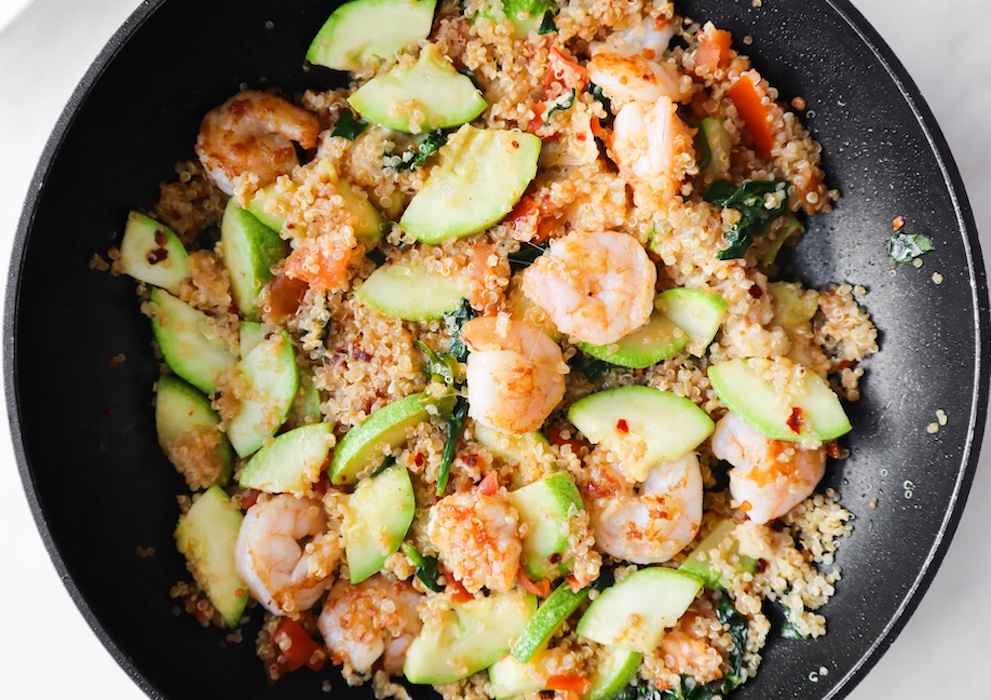
Sautéed Yellow Squash Skillet
Calories: 98 Fat: 8.3g Total Carbs: 5.5g
Net Carbs: 5.5g Fiber: 0g Protein: 2g
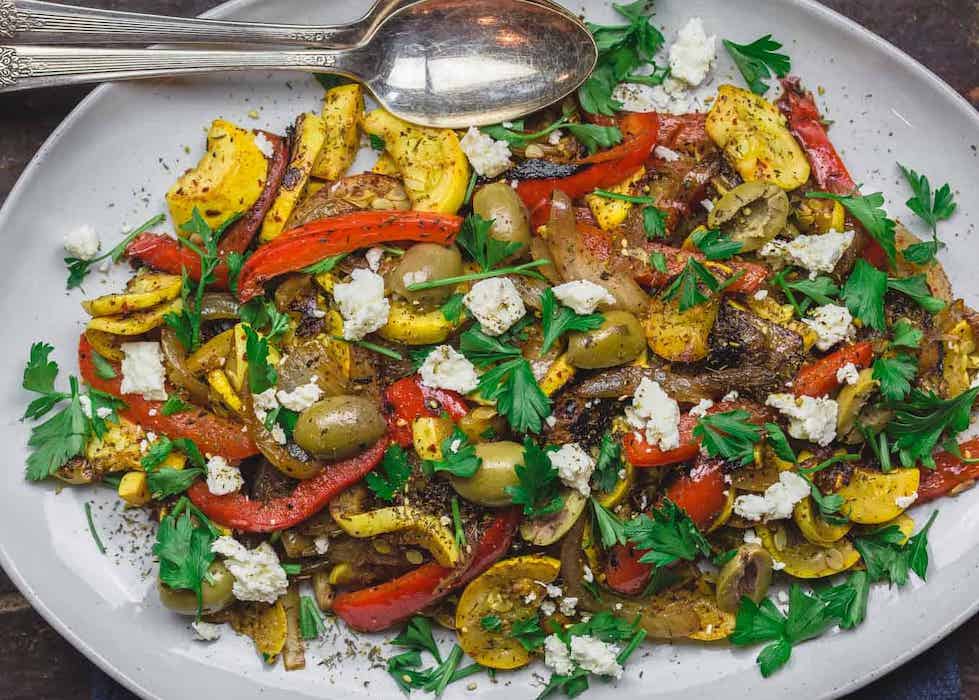
Baked Tilapia with Lemon
Calories: 320 Fat: 6.3g Total Carbs: 6.3g
Net Carbs: 5.1g Fiber: 1.2g Protein: 39.2g
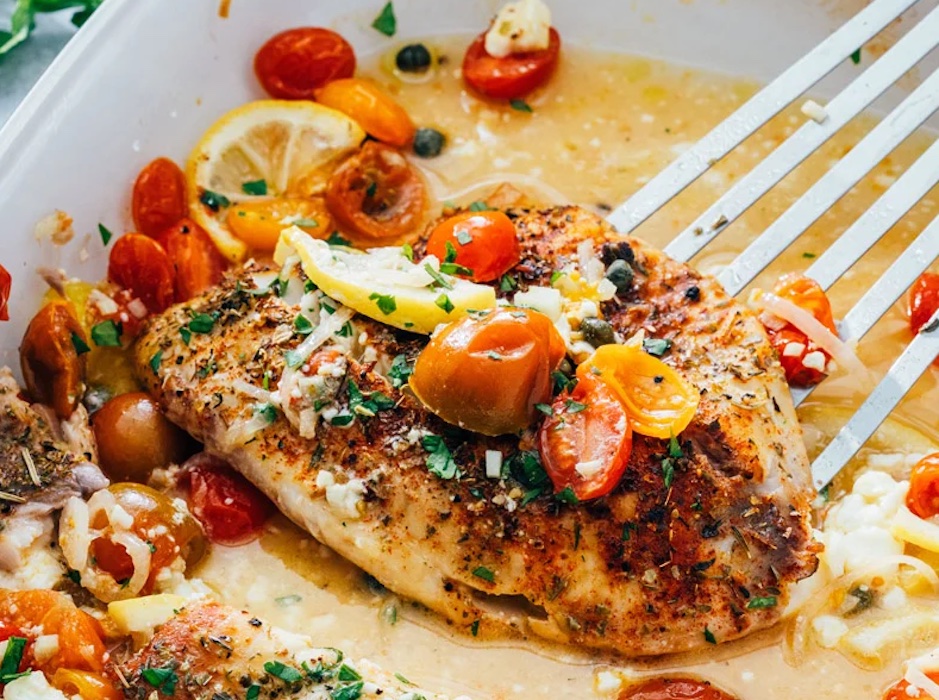
Grain Bowl with Sautéed Spinach
Calories: 458 Fat: 21g Total Carbs: 56g
Net Carbs: 47g Fiber: 9g Protein: 14g
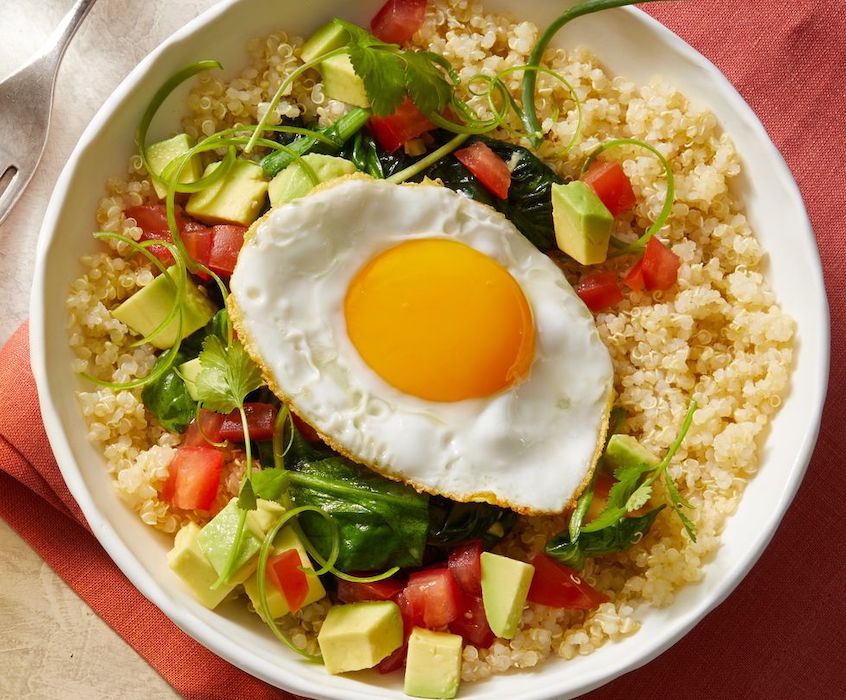
Salmon Pita Sandwich
Calories: 239 Fat: 7.1g Total Carbs: 19g
Net Carbs: 16.7g Fiber: 2.3g Protein: 24.8g


